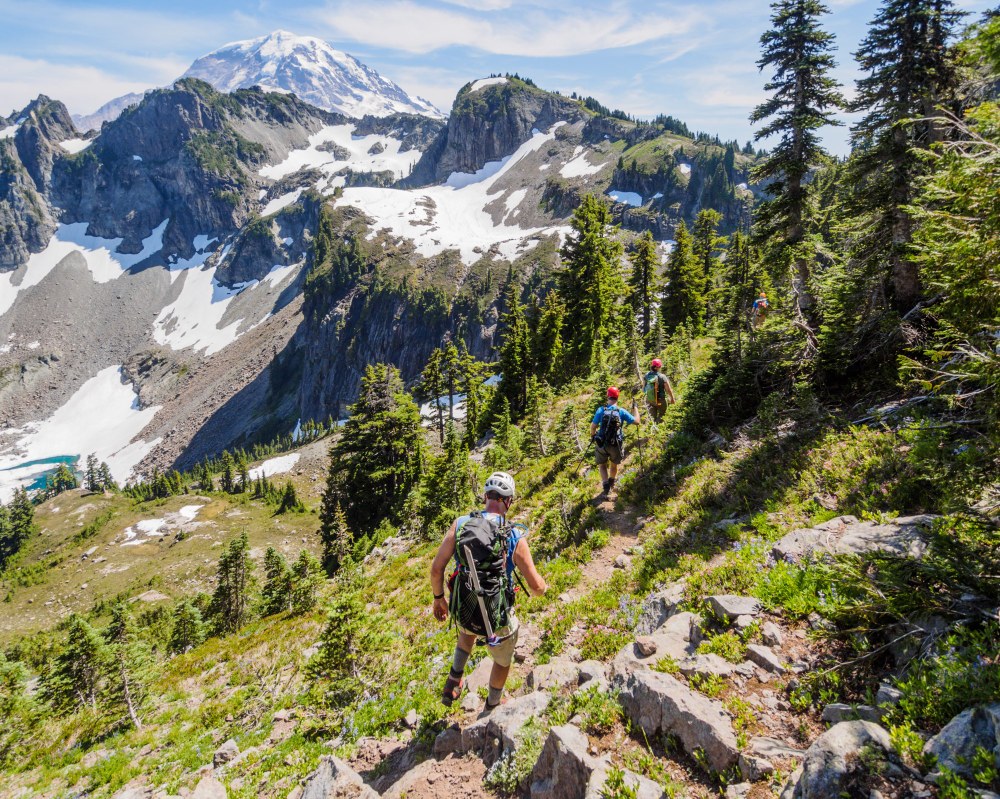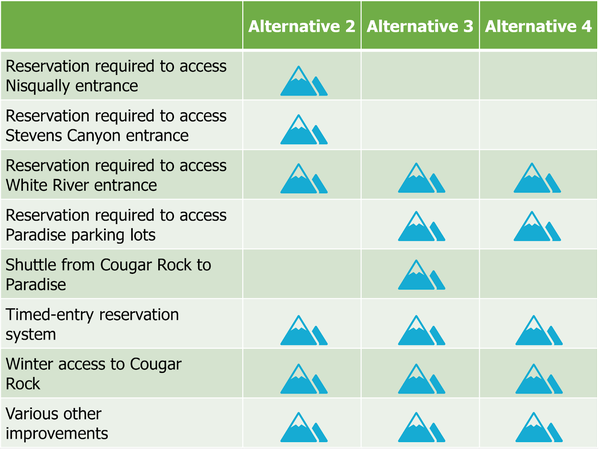
Note: The comment period for the draft visitor use management plan is now closed. We'll continue to update our community as this process develops. Thank you for your interest and engagement in this important issue.
Last month, we shared that Mount Rainier National Park is proposing to implement timed-entry reservations. The Nisqually to Paradise Corridor Draft Management Plan proposes several options for a new timed-entry reservation system to access popular areas of the park during the peak summer season. The Park is seeking feedback from the public before they make their final decision. The deadline to submit comments to the park is June 26.
Mountaineers conservation and programs staff have thoroughly reviewed the draft plan, received feedback from volunteer leaders, and met with Park leadership. We strongly encourage all Mountaineers to review the draft plan and share your feedback. In this blog, we’ll share our organization’s perspectives on the draft plan to help inform your comments.
The Mountaineers is concerned that timed-entry reservations would make it more challenging and burdensome for our programs to access the park for courses and trips. Given that Mount Rainier is an unparalleled outdoor education resource, this would hinder our ability to fulfill our mission and connect people to the natural world. We also have concerns with the unintended effects of the plan on underserved communities. While we understand the need to address congestion and better protect natural resources, we believe significant changes are necessary before finalizing this plan.
Summary of the Draft Plan
You can learn more about the draft plan in this blog post, but here’s a brief summary of the key issues, goals, and proposed options.
- The park has been developing this plan for the last several years and previously sought public feedback in 2020 and 2021.
- The stated goal of the plan is to provide high-quality visitor experiences while protecting park resources and values. The Park believes that limiting the number of people in popular areas of the park at any given time will help address issues like roadway and parking lot congestion, crowding, and degradation of natural and cultural resources.
- The draft plan includes four alternatives (options): a no-action alternative and three action alternatives that include some variation of a timed-entry reservation system from approximately July 1 to Labor Day, seven days a week from 7am to 5pm.
- The Park’s preferred alternative, Alternative 2, would require a timed-entry reservation to access the Nisqually, Stevens Canyon, and White River entrances. Alternatives 3 and 4 would require reservations to access the Paradise parking lots and the White River entrance. Alternative 3 also includes a shuttle system from Cougar Rock to Paradise. You can learn more about these options in the table below.
The Mountaineers Perspective
The Mountaineers is a longstanding partner of Mount Rainier National Park and we are well aware of the Park’s challenges in managing increased visitation. As more people want to experience the spectacular beauty of Mount Rainier, it becomes harder for the park to provide a quality experience for visitors and protect natural and cultural resources.
While we understand the Park’s challenges and accept the need to more tightly manage peak visitation, we have serious concerns with several aspects of the plan that must be addressed before the park finalizes their decision.
Effects on Mountaineers Programs
Mount Rainier National Park and the Paradise area in particular is a tremendous outdoor education resource for The Mountaineers and similar groups due to the opportunities it provides to teach skills like glacier travel, avalanche safety and snow skills, snowshoeing, hiking, and scrambling. While trips and courses that require permits would not be required to obtain separate timed-entry reservations under the plan, the majority of Mountaineers programs would be required to obtain reservations just like the general public.
Group Reservations
Currently, the draft plan is centered around vehicle reservations, and is silent on whether group reservations would be allowed. Without a group reservation option, every vehicle on a Mountaineers trip would need to have the same timed-entry reservation window. Volunteer leaders already face administrative challenges to offering trips, and a timed-entry system would add additional burden. For example, leaders may have to list trips months in advance to ensure the best chance of synchronizing timed-entry reservations, or may end up scrambling to secure another reservation if the holder of a timed-entry reservation cancels on a trip.
Any timed-entry reservation system must allow leaders and staff to secure group reservations on a short- and long-term basis. There must be an ability to make reservations several weeks or days before, as well as same-day reservations to allow for plans to change depending on weather and conditions. Without the ability to make group reservations and allow for flexible planning, the plan would have the unintended consequence of limiting opportunities for learning outdoor skills and safety techniques. As one leader shared with us, “More than anything, [the plan] would reduce the number of trips offered, as leaders would likely determine that some potential trips are not worth the effort of going through the red tape of the reservation system.”
Climbing and Wilderness Permits
The draft plan states that visitors with a climbing or wilderness permit would not have to obtain a separate park entrance reservation. However, it is unclear whether a visitor must also make a separate reservation to enter the park in advance to pick up their permit in person. We believe that leaders who have secured a permit ahead of time should be allowed a window of admission to pick up their permit and speak with a ranger. Alternatively, this could be done by phone or virtually.
According to the plan, visitors seeking walk-up climbing and wilderness permits would need a timed-entry reservation - a “permit for a permit.” This adds yet another administrative hurdle for a Mountaineers leader trying to plan a trip, especially when looking to Mount Rainier National Park destinations as an alternative location for a trip affected by adverse conditions elsewhere. The plan should allow for the ability to obtain walk-up permits without needing a separate timed-entry reservation, either in-person outside the park, by phone, or virtually.
Equitable Access
As the draft plan itself states, “A reservation system requires visitors to book their visit in advance, requires technological access to a website, and costs additional money.” The Mountaineers is concerned that a reservation system would likely create barriers to access for people who don’t have easy access to technology, don’t speak fluent English, have unpredictable work or family commitments that limit their ability to plan ahead, or are new to visiting public lands. While these barriers affect all kinds of people, they disproportionately affect people from low-income, underserved, and rural communities.
The Mountaineers believes that all people should have the opportunity to access and find belonging in the outdoors. This starts with reducing barriers and creating welcoming spaces. There are already many existing barriers to visiting public lands: the cost of gear and passes, need for transportation, need for time off, etc. A timed-entry reservation system makes something that’s already inequitable more so. It also increases the perception that the park is only accessible to certain types of people.
Additional administrative requirements for facilitated outdoor recreation programs like The Mountaineers also raises questions of equity. Many people are first introduced to the outdoors through facilitated outdoor experiences through The Mountaineers, the YMCA, or other programs that provide services for underserved communities. Others simply feel more comfortable accessing public lands as part of a group.
We believe the Park should give more serious consideration to strategies such as shuttles, same-day reservations, group reservations, making reservations available by phone, and providing information in multiple languages. In particular, a shuttle system from outside both the Nisqually and White River entrances would allow people to continue to experience the park without a reservation. While it is challenging to design a plan that meets the needs of all visitors, the park should center equity as a way to improve the overall park experience while addressing issues caused by congestion and crowding.
Looking Ahead
It’s no easy task to develop equitable ways to accommodate ever-increasing use while protecting the places we love. These are challenging issues, and no one enjoys making a reservation to go for a hike, enjoy a picnic, or climb a mountain. In the long term, protecting public lands and the outdoor experience is paramount. It is critical to implement reservation and permit systems carefully and with robust input from the communities most affected.
The changes proposed by Mount Rainier National Park will have wide-ranging effects on the public’s ability to experience the park, and we believe the draft plan needs significant revisions and substantially more public input to avoid unintended negative impacts on our communities. The finalization of the plan and its implementation should be incremental and informed by robust public outreach.
Regardless of the final decision, The Mountaineers will continue to be a strong advocate for robust funding for the National Park Service and other public land managers. The park’s budget has not kept up with the increased challenges of managing visitation and protecting natural and cultural resources, and this plan will undoubtedly require additional resources. If outdoor enthusiasts continue to steward and advocate for our public lands, we can ensure these special places will be protected for future generations.
Speak Up
Mount Rainier National Park is accepting comments on the draft plan through June 26. This is likely your last chance to comment before a final course of action is determined. The Park will review all submitted comments this summer and make a final decision later this year. Any changes would begin to be implemented in 2024.
We encourage you to share your feedback on the draft plan directly with the Park, especially how the plan will affect how you experience the park through Mountaineers programs or personal trips. Comments that describe how the plan will affect your personal experience and suggestions for how to improve the plan and mitigate unintended consequences are most helpful for Park leadership. Thank you for continuing to speak up for public lands and the outdoor experience.
 The Mountaineers
The Mountaineers
